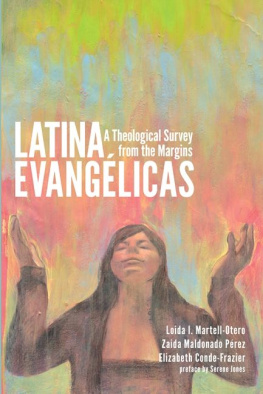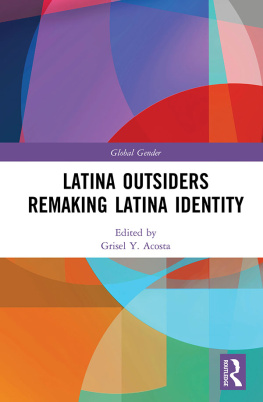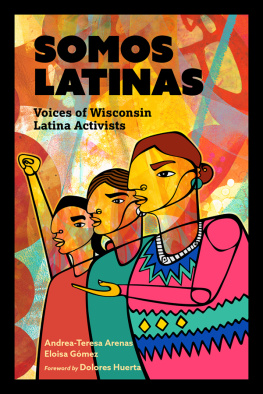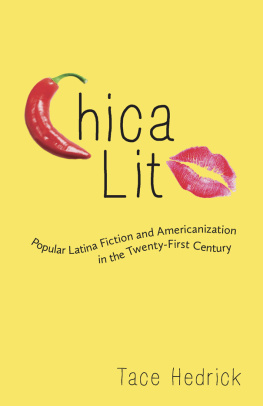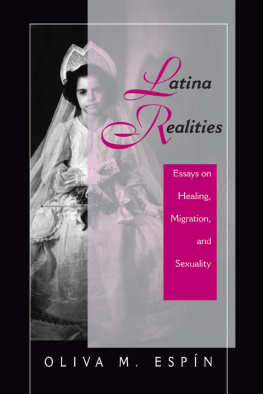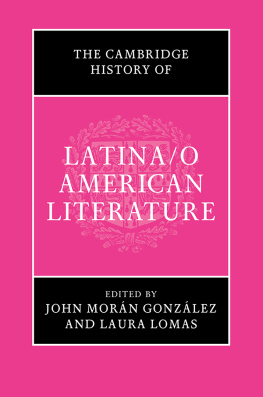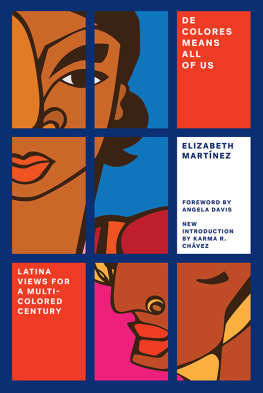Table of Contents

Latina Evanglicas
A Theological Survey from the Margins
Loida I. Martell-Otero, Zaida Maldonado Prez, and Elizabeth Conde-Frazier

LATINA EVANGLICAS
A Theological Survey from the Margins
Copyright 2013 Loida I. Martell-Otero, Zaida Maldonado Prez, and Elizabeth Conde-Frazier. All rights reserved. Except for brief quotations in critical publications or reviews, no part of this book may be reproduced in any manner without prior written permission from the publisher. Write: Permissions, Wipf and Stock Publishers, W. th Ave., Suite , Eugene, OR 7401 .
Cascade Books
An Imprint of Wipf and Stock Publishers
W. th Ave., Suite
Eugene, OR 97401
www.wipfandstock.com
isbn : -- 60899 -
eisbn : 978-1-62189-509-1
Cataloging-in-Publication data:
Martell-Otero, Loida I., 1953
Latina evanglicas : A theological survey from the margins / Loida Martell-Otero, Zaida Maldanado Prez, Elizabeth Conde-Frazier ; Foreword by Serene Jones.
xiv + p. + cm.Includes bibliography and indexes.
isbn : -- 0899 -
. Hispanic American Theology.. Protestant churchesDoctrine. I. Maldonado Prez, Zaida. II. Conde-Frazier, Elizabeth. III. Jones, Serene (1959). IV. Title.
BT 83575 L 2013
Manufactured in the USA
Scripture quotations in English marked (NIV) are taken from the Holy Bible, New International Version, NIV. Copyright 1973 , , 1984 , 2011 by Biblica, Inc. Used by permission of Zondervan. All rights reserved worldwide. www.zondervan.com/.
Scripture quotations in English marked (NRSV) are taken from New Revised Standard Version Bible, copyright 1989 National Council of the Churches of Christ in the United States of America. Used by permission. All rights reserved.Scripture quotations in Spanish are taken from the Reina-Valera version. Copyright Sociedades Bblicas en Amrica Latina; Copyright renewed 1988 United Bible Societies. Used by permission.
Chapter , Evanglicas Reading Scriptures: Readings from Within and Beyond the Tradition, includes work from Seeking Guidance from the Word: U.S. Latino/a Religious Communities and Their Scriptures by Efrain Agosto, Brian Clark, Elizabeth Conde-Frazier and Jacqueline Hidalgo, Presented to Reading Scriptures, Reading America Conference at the Institute for Signifying Scriptures of Claremont Graduate University, October , 2009 . Research for this report was done under the auspices of the Institute for Signifying the Scriptures and its Scriptural Ethnologies Project.
Loida: To Vitelva Ortz and Francisca (Paquita) Flores for teaching me about the Bible and the love of Jesus.
Elizabeth: To all the women who taught us theology through their vivencia .
Zaida: A las mujeres valientes y luchadoras en mi vida: mi madre, Ruth, mi hija, Jazzlin Ruth, mi abuelita, Perfecta, mi maestra de escuela dominical, Mery, y las muchas ms que Dios conoce.
Este maana es tuyo, nena
(This tomorrow is yours, girl)
By Zaida Maldonado Prez
September , 2012
Maana, maana, maana
Bursts from yesterdays grip
Biding, compelling, inciting
Get up, mi Reina! Palante, S , se puede, nena!
Life is yours, mine, ours
What are you waiting for?!
Strut that beautiful body toward the prize
Walk it, jump it, crawl to it, run it
However and whatever it takes, mami
You got it cause God gave it to you
You got el Padre , you got el Hijo and you got Esp ritu Santo
You got coraje!
It runs through your veins as Tano , African, Mayan and Spanish blood
Its warrior blood
The kind that doesnt give up or fret cuando la cosa se pone dura*
This is your hour upon the stage
Show us what you got, chula
Bless us with the light that you see
The candela that drives you
The truth that carries you to the many
Maana, maana, maanas
Oh, and while you are at it,
Look back!... look back
To the trail of women that follow you
The cola of mujeres that you have inspired
And, be blessed, mamita, be blessed
*when things get difficult
Contributors
Elizabeth Conde-Frazier is Academic Dean of Esperanza College of Eastern University in Philadelphia. Among her contributions, she has published A Many Colored Kingdom: Multicultural Dynamics for Spiritual Formation and Listening to the Children: Conversations with Immigrant Families .
Serene Jones is President of Union Theological Seminary in the City of New York and Roosevelt Professor of Systematic Theology. Her publications include Trauma and Grace: Theology in a Ruptured World , Feminist Theory and Christian Theology and Calvin and the Rhetoric of Piety .
Zaida Maldonado Prez , Dean of the School of Urban Ministries at Asbury Theological Seminary, Florida-Dunnam Campus and Professor of Church History and Theology. Her publications include The Subversive Role of Vision in Early Christian Martyrs , and An Introduction to Christian Theology , coauthored with Justo L. Gonzlez.
Loida I. Martell-Otero is Professor of Constructive Theology at Palmer Theological Seminary of Eastern University, King of Prussia, Pennsylvania. She coedited Teologa en Conjunto: A Collaborative Hispanic Protestant Theology with Jos D. Rodrguez and has published on topics related to Christology, soteriology, vocation, and spirituality.
Foreword
R arely do I come across a book in the field of systematic theology that by the end of the first page has stirred in me three very different reactions. It made me think very, very hard. It surprised me with the newness of its idea. And best of all, it caused me to smile. How is it that one book can provoke all three?
The thinking hard part was elicited by the seriousness these scholars bring to the old-fashion work of systematic theological reflection. Its an example of classical doctrinal refashioning at its best. The surprise part was stirred by the freshness of their approach, in both content and style. I promise you the ideas and narratives written on these pages are unlike any you have encountered in previous texts. The smile partwell, it has numerous roots. I smile with admiration for a project whose time has come. I smile with appreciation for hard work poured into the book: its scope is broad, its waters deep, and hence its labors most certainly were long. I smile at the vivid images that came dancing across the page towards me as I read. The thoughts, ideas, theology, and stories that compose evanglica theology are alive, playful, one might even say pregnant with theological meaning.
In this book, three leading North American Christian theologians take up the ancient theological task of helping faith seek understanding for the sake of the present day church and its witness in the world. For Loida Martell-Otero, Elizabeth Conde-Fraizer, and Zaida Maldonado Prez, this seeking is not general or abstract, however. They undertake the task of theological reflection with their feet firmly planted in the church community that formed themthe rich world of Protestant Latina womens lived experience. They seek, on behalf of that community, to name themselves as evanglica rather than be named by others. That their feet are planted in the soil of a community that, according to recent demographic studies, is the largest group of Protestant women in the world today makes the work even more prodigious and important. That they are speaking out and writing about a religious reality that has been silenced for too long makes the work truly historic.

